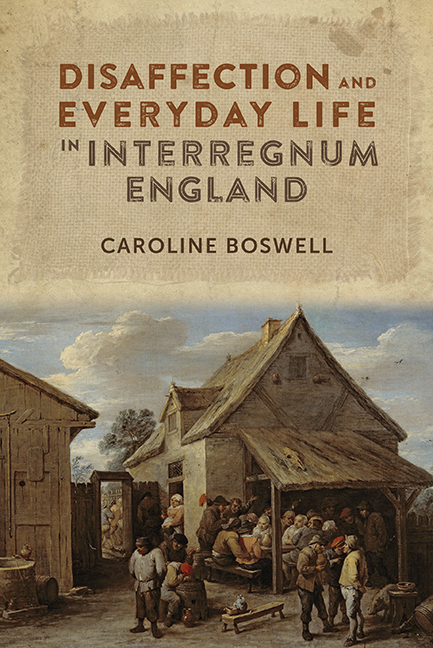Book contents
- Frontmatter
- Dedication
- Contents
- List of Illustrations
- Acknowledgements
- List of Abbreviations
- Introduction
- Part I Sites of Disaffection
- 1 Streets and Marketplaces
- 2 Drink and Disaffection
- Part II Objects of Disaffection
- Conclusion
- Bibliography
- Index
- STUDIES IN EARLY MODERN CULTURAL, POLITICAL AND SOCIAL HISTORY
1 - Streets and Marketplaces
from Part I - Sites of Disaffection
Published online by Cambridge University Press: 23 August 2019
- Frontmatter
- Dedication
- Contents
- List of Illustrations
- Acknowledgements
- List of Abbreviations
- Introduction
- Part I Sites of Disaffection
- 1 Streets and Marketplaces
- 2 Drink and Disaffection
- Part II Objects of Disaffection
- Conclusion
- Bibliography
- Index
- STUDIES IN EARLY MODERN CULTURAL, POLITICAL AND SOCIAL HISTORY
Summary
As dust settled over the marketplace at New Malton, Yorkshire, artisans and grocers began the usual practice of shutting up their shops and stalls while a group of boys gathered to play in the shadows of the market cross. The predictable hustle-and-bustle of the end of the day was interrupted when a group of four royalists allegedly stumbled – wanded bottle in hand – through the marketplace. As they approached the cross, the fellows – Christopher Nendike, Captain John Denton, Richard Montaigne and one unknown man – allegedly drank to the health of Charles Stuart, the son and heir of the executed Charles I. Following this bold utterance, the four elites proceeded to draw their swords and, according to witnesses, loudly proclaim Charles II “King of England, Scotland, France and Ireland”. Following this performance, the company of drinkers left the cross “singing” and ventured into John Williamson's tavern, where, swords still drawn, they supposedly called for more “wyne” and pestered other drinkers who refused to kiss a sword.
To appreciate the significance of this treasonous proclamation performed in New Malton's marketplace, we must consider the prior use of that cross for the Commonwealth's official declaration of the act forbidding the proclamation of any person as monarch. On the very same day that the axe fell on Charles I in January 1649, Parliament released an act that prohibited proclaiming any person king – particularly the elusive Prince Charles. Two months later in March, the Commons confirmed an act abolishing the monarchy, which they ordered to be ceremoniously read in the “Market Towns” throughout the nation. Despite these interdictions, the four gentlemen in New Malton chose to reject these acts through a performance that emulated the very same rites of power and legitimacy practiced by Commonwealth officials. Indeed, witness testimonies suggest that the official and illegal proclamations concerning the monarchy performed at the market cross were connected in the memory of a few deponents. While some witnesses claimed the four men gathered in the marketplace “two years” before in March 1649 – around the time of the official proclamation – many others claimed the scene occurred “a twelvemonth ago”, or around March 1650. Time, space and opinion were blurred in social memory, which suggests that the men's proclamation at New Malton's marketplace was intimately linked to the official proclamation abolishing the monarchy in the minds of many locals.
- Type
- Chapter
- Information
- Disaffection and Everyday Life in Interregnum England , pp. 21 - 70Publisher: Boydell & BrewerPrint publication year: 2017



